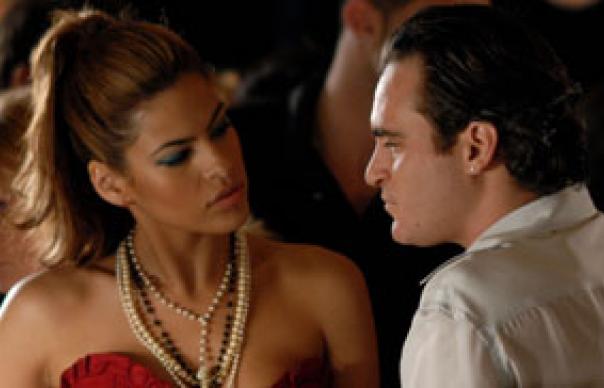DIR JAMES GRAY ST JOAQUIN PHOENIX, MARK WAHLBERG Gray's third film (after Little Odessa and The Yards), this is also his best. A somber New York gangster thriller set in the 1980s, like its predecessors, it tells the familiar story of siblings on opposite sides of the law. Joseph (Mark Wahlberg) is a cop like his hard-ass old man (Robert Duvall). Bobby (Joaquin Phoenix) is the black sheep, a Brighton Beach nightclub manager who runs with wolves even if he's not a criminal himself - and don't imagine they haven't looked into that possibility. When Russian drug dealers try to knock off his brother, and his father takes over the investigation, Bobby realizes it's time to face his responsibilities and do the right thing. On the face of it this is hackneyed stuff. As more than one critic has noted, the story might have been made back in 1930s. But look closer. Gray doesn't celebrate Bobby's return to the fold. Instead he crafts a plangent, subtly subversive fugue, less interested in redemption than self-sacrifice and loss. Sensual, confident and free when we first see him - every inch his own man - Bobby gradually shuts down and withdraws as his actions become more conventionally "heroic": wearing a wire; testifying in court; eventually, inevitably, picking up a gun. In closing ranks with the boys in blue he forfeits almost everything attractive about himself, most poignantly his passionate relationship with beautiful girlfriend Amada (Eva Mendes - who's rarely been better). That's not to say what he does is wrong - in a sense it's a metaphor for growing up - but that's the tragedy of it. Like Wahlberg, a graduate of The Yards, Phoenix is immensely sympathetic here - it's rare to see a leading man willing to show such vulnerability. (In fact Gray's ear is less sure with the macho Duvall figure, where he has a tendency to over-compensate.) Gray is a self-conscious classicist. His camera doesn't shake; it paints a picture. Now that 1970s storytelling is back in vogue, perhaps his time has come. Wreathed in gloom and doom, We Own The Night is shot with dark authority by Joaquin Baca-Asay. Three superbly orchestrated shoot-outs are up there with the best in the annals of the genre - he even finds a new angle on a car chase - but these flourishes are as nothing to the violence Bobby wreaks on his own troubled soul. The title, incidentally, comes from an official NYPD insignia, circa 1985. I've a hunch Gray means it ironically. Tom Charity
DIR JAMES GRAY
ST JOAQUIN PHOENIX, MARK WAHLBERG
Gray’s third film (after Little Odessa and The Yards), this is also his best. A somber New York gangster thriller set in the 1980s, like its predecessors, it tells the familiar story of siblings on opposite sides of the law. Joseph (Mark Wahlberg) is a cop like his hard-ass old man (Robert Duvall). Bobby (Joaquin Phoenix) is the black sheep, a Brighton Beach nightclub manager who runs with wolves even if he’s not a criminal himself – and don’t imagine they haven’t looked into that possibility. When Russian drug dealers try to knock off his brother, and his father takes over the investigation, Bobby realizes it’s time to face his responsibilities and do the right thing.
On the face of it this is hackneyed stuff. As more than one critic has noted, the story might have been made back in 1930s. But look closer. Gray doesn’t celebrate Bobby’s return to the fold. Instead he crafts a plangent, subtly subversive fugue, less interested in redemption than self-sacrifice and loss. Sensual, confident and free when we first see him – every inch his own man – Bobby gradually shuts down and withdraws as his actions become more conventionally “heroic”: wearing a wire; testifying in court; eventually, inevitably, picking up a gun. In closing ranks with the boys in blue he forfeits almost everything attractive about himself, most poignantly his passionate relationship with beautiful girlfriend Amada (Eva Mendes – who’s rarely been better). That’s not to say what he does is wrong – in a sense it’s a metaphor for growing up – but that’s the tragedy of it.
Like Wahlberg, a graduate of The Yards, Phoenix is immensely sympathetic here – it’s rare to see a leading man willing to show such vulnerability. (In fact Gray’s ear is less sure with the macho Duvall figure, where he has a tendency to over-compensate.) Gray is a self-conscious classicist. His camera doesn’t shake; it paints a picture. Now that 1970s storytelling is back in vogue, perhaps his time has come. Wreathed in gloom and doom, We Own The Night is shot with dark authority by Joaquin Baca-Asay. Three superbly orchestrated shoot-outs are up there with the best in the annals of the genre – he even finds a new angle on a car chase – but these flourishes are as nothing to the violence Bobby wreaks on his own troubled soul. The title, incidentally, comes from an official NYPD insignia, circa 1985. I’ve a hunch Gray means it ironically.
Tom Charity



